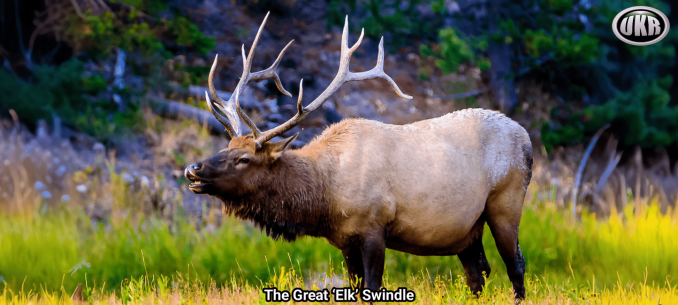
BERT BURNETT
THE rewilding lobby has done it again. In their latest bout of ecological romanticism, the Nottinghamshire and Derbyshire Wildlife Trusts have secured £15,000 to ‘study’ the feasibility of reintroducing elk – or, more accurately, what Europeans insist on calling elk but which the rest of the world knows as moose (Alces alces). This is not conservation; it is a circus act, a distraction from the real issue: the systematic vilification of Britain’s native deer in pursuit of grant money and headlines.
Rewilding advocates are quick to paint our existing deer populations as voracious tree-killers, demanding culls to ‘save the forests’. Yet these same enthusiasts now propose introducing a far larger, more destructive ungulate – one that can weigh over half a ton and stand nearly 7ft at the shoulder, bulldoze saplings with ease, and has a notorious temper when provoked. The hypocrisy is staggering.
Red deer, roe deer and fallow deer already perform the ecological role these rewilders claim to desire: controlling undergrowth, shaping woodland edges, and maintaining biodiversity. But native deer don’t generate the same PR buzz as a headline-grabbing megafauna revival. Worse still, they don’t unlock the same funding streams.
Let’s be clear: the ‘elk’ proposed for reintroduction are moose. The British public, already struggling with the concept of wild boar reintroductions (which have led to escaped populations and farmer outcry), are being sold a fantasy. Moose are not docile landscapers – they are temperamental, territorial, and, when protecting calves, lethally aggressive.
In Scandinavia and North America, moose collisions cause hundreds of deaths annually. A full-grown bull can write off a car with a single charge. Are we really to believe that the Peak District, criss-crossed with narrow country lanes, is the ideal habitat for an animal that regularly strays on to roads?
Rewilding Britain, the organisation funding this study, is part of a growing industry that thrives on taxpayer subsidies and charitable donations. The playbook is simple:
- Demonise existing species (deer, in this case) to justify culls;
- Propose a charismatic replacement (elk/moose, beavers, lynx) to attract funding;
- Secure grants for ‘feasibility studies’, which inevitably conclude that reintroduction is ‘essential’;
- Release the animals, then absolve yourself of responsibility when they damage crops, cause accidents, or disrupt ecosystems.
It’s a lucrative cycle. Once the elk are introduced, who pays for the fencing? The road signs? The compensation to farmers when a moose demolishes a hedgerow or charges a dog walker? Not the rewilding trusts – they’ll be too busy applying for the next round of funding to reintroduce wolves.
Rewilding’s track record is mixed at best. Beavers, hailed as wetland saviours, have flooded farmland and forced expensive mitigation efforts. White storks, another vanity project, compete with native birds for nesting sites. And let’s not forget the ill-fated attempt to reintroduce sea eagles to East Anglia, which saw the birds promptly devastate local wader populations.
Yet when these schemes go awry, the rewilding lobby shrugs. There is no accountability – only an insatiable demand for more experiments, more disruption, and more public money.
If we truly care about restoring balance to Britain’s ecosystems, we should start by managing what we already have. Proper deer management, through controlled culling and habitat planning, could achieve the same ‘ecological landscaping’ which rewilders crave without introducing an unpredictable, dangerous species.
But that doesn’t make for a sexy press release. And it certainly doesn’t unlock the same funding.
This article (The Great ‘Elk’ Swindle) was created and published by Country Squire Magazine and is republished here under “Fair Use” with attribution to the author BERT BURNETT

••••
The Liberty Beacon Project is now expanding at a near exponential rate, and for this we are grateful and excited! But we must also be practical. For 7 years we have not asked for any donations, and have built this project with our own funds as we grew. We are now experiencing ever increasing growing pains due to the large number of websites and projects we represent. So we have just installed donation buttons on our websites and ask that you consider this when you visit them. Nothing is too small. We thank you for all your support and your considerations … (TLB)
••••
Comment Policy: As a privately owned web site, we reserve the right to remove comments that contain spam, advertising, vulgarity, threats of violence, racism, or personal/abusive attacks on other users. This also applies to trolling, the use of more than one alias, or just intentional mischief. Enforcement of this policy is at the discretion of this websites administrators. Repeat offenders may be blocked or permanently banned without prior warning.
••••
Disclaimer: TLB websites contain copyrighted material the use of which has not always been specifically authorized by the copyright owner. We are making such material available to our readers under the provisions of “fair use” in an effort to advance a better understanding of political, health, economic and social issues. The material on this site is distributed without profit to those who have expressed a prior interest in receiving it for research and educational purposes. If you wish to use copyrighted material for purposes other than “fair use” you must request permission from the copyright owner.
••••
Disclaimer: The information and opinions shared are for informational purposes only including, but not limited to, text, graphics, images and other material are not intended as medical advice or instruction. Nothing mentioned is intended to be a substitute for professional medical advice, diagnosis or treatment.
Disclaimer: The views and opinions expressed in this article are those of the author and do not necessarily reflect the official policy or position of The Liberty Beacon Project.






Leave a Reply